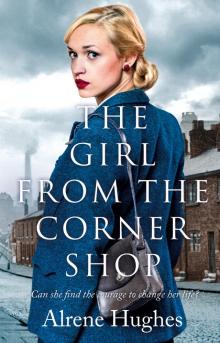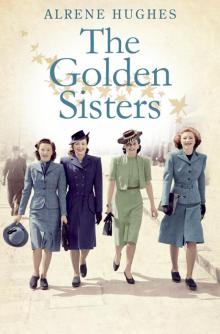- Home
- Alrene Hughes
A Song in my Heart Page 27
A Song in my Heart Read online
Page 27
Martha wasn’t sure whether he meant he would sell the shop or not, but Peggy owed it to him to keep it open until he decided.
When Martha explained the situation that night, Peggy was upset. ‘How could he even think about selling the shop? Esther loved it there … and I’ll never get another job like that.’
‘He’s devastated,’ explained Martha. ‘He just sits there all day and I don’t think he’s eating properly. He can’t face the world, never mind his shop. We have to help him.’
‘Can you manage in the shop on your own, Peggy?’ asked Pat.
‘It really needs two people and I wouldn’t have the time to order new stock and then there’s the concerts for the troops … Oh, I don’t know.’
‘Maybe it would be best to cancel the concerts for the time being,’ said Pat. ‘Then if Mr Goldstein comes back to work he could re-book them. But I’ve got a feeling that slowly but surely the Forces are beginning to leave Northern Ireland.’
‘Could you manage if you had someone to help you?’ asked Martha.
‘Yes, but how would I get someone? Mr Goldstein won’t be putting an advertisement for an experienced shop assistant in the Belfast Telegraph, will he?’
‘He doesn’t need to,’ said Martha. ‘I’ll do it.’
‘What, place an advertisement?’
‘Of course not,’ she said. ‘I mean I’ll work in the shop with you.’
Peggy looked sceptical. ‘You can’t work in a music shop.’
‘Why not? I have experience in a butcher’s and a grocery shop. I can add up and give change. I play the piano and have some knowledge of classical and popular music. I have a pleasant manner and a very nice navy woollen dress. And if that’s not enough I can also use a bacon slicer.’
‘Oh Mammy, you do make me laugh,’ said Pat. ‘What do you think, Peggy? Has she got the job?’
Peggy smiled in spite of herself. ‘I’ll give you a week’s trial.’
Martha was soon into the routine of visiting Goldstein for an hour or two each morning and they’d sit and talk until it was time for her to go and work in the shop.
In the beginning, they talked about Esther – sad things mostly. He couldn’t reconcile the fact that she had escaped Warsaw only to die in Belfast. He talked about the rest of his family in Poland and how the letters from his sister had ceased once the Nazis had occupied the city. But before Martha left each day, she tried to bring him round to thinking about happy memories of Esther and his family.
There were some awful mornings when he couldn’t speak at all and she sat with him in silence. Other times, he was content to listen to her talk and she chatted about anything that came into her head. She would tell him about the happenings in the shop, but he never commented. It was as if it didn’t exist any more.
One bright morning in early March, Martha arrived at Goldstein’s and announced that it was time he got out of the house. ‘Get wrapped up,’ she told him. ‘We don’t want you catching a chill because you haven’t been over the door for weeks. We’ll not go too far today – end of the street and back’ll do.’
Every day for a fortnight they went walking, further and further each time. ‘It’ll build up your strength and put fresh air in your lungs,’ she told him, and it was true. He seemed brighter and more willing to talk. One morning in late March, there was a real sense of spring in the air and Martha suggested they should walk up the hill behind his house on a path that led to the castle.
The trees were covered in buds and there were primroses on the edge of the lane. They walked in comfortable silence broken only by the sound of birdsong in the air. The path skirted the castle itself and took them to a higher vantage point from where they had a panoramic view of the city far below them to the right. They stood a while, each with their own thoughts, and it was Goldstein who broke the silence. ‘Esther loved Belfast, you know. She would always say, “I was lucky I had an uncle here or I could have ended up anywhere.” She loved the shop too. It would have been hers …’
The wind was getting up – it was time to go. Back on lower ground, Goldstein seemed in the mood to talk. ‘I was wrong to sit there in the house all this time. You can mourn anywhere and sometimes different surroundings give you a clearer view of what you have lost and what you still have.’
Martha left him to his door. ‘Same again tomorrow?’ she said.
‘Indeed, Martha.’
‘I’ll see you then, Mr Goldstein.’ She turned to go.
‘Martha.’
She looked back. ‘Yes?’
‘Please call me Isaac.’
The following day, when Martha arrived at Goldstein’s house she could see that everywhere was neat and tidy and the windows were open to let in the fresh air. His voice was brighter too. ‘I have been up since seven, went for a walk then came back and sorted out some things in the house.’
‘I’m impressed,’ said Martha.
‘I was thinking maybe I might go into the shop, just for an hour or two, to see how Peggy is getting on.’
‘That’s a good idea, Isaac.’
He hesitated. ‘I wonder … whether you would accompany me?’
Chapter 32
‘Hurry up, Jessica, or we’ll be late,’ shouted Sheila.
‘Calm down, they won’t go without us.’ Jessica buttoned up her tunic and placed her WAAF cap at a jaunty angle. ‘Can’t see why we have to wear our uniforms when strictly speaking we’re off duty. I ask you, how the hell can we roller skate in a skirt? I’ll end up showing everyone my knickers.’
‘Well, you’d better make sure you stay on your feet then,’ said Sheila.
The lorry was outside the NAAFI with its engine running and, as soon as Sheila and Jessica had been hauled inside to join their dozen or so friends, they were away. ‘First stop, Londonderry!’ shouted Clemmie to cheers.
The lorry pulled up outside what looked like a very large church hall and they all bailed out and joined the queue to pay their money and collect a pair of battered roller skates. Inside the hall it was mayhem. There was music playing loudly, accompanying the rattle of skates on the parquet floor and the skaters themselves shouting to be heard or squealing with excitement. Sheila had never donned a pair of roller skates and once she had strapped them on she teetered at the very edge of the floor, uncertain of what to do. People were flying past her, all in the same direction. She stepped out into the flow and pushed one leg forward, but when she tried to lift the other leg she found that the skate on the floor had rolled ahead and she fell backwards, legs in the air, and put her hands out to save herself. The skaters veered round her, but one was unable to avoid her and ran over her hand. Worse was to come as she tried to push herself on to her feet; the skates kept slipping forward and she panicked, thinking she would never be able to right herself. Suddenly someone grabbed her under the arms and lifted her on to her feet. ‘Stand straight. Stand straight.’ And the hands shifted to her waist and steered her to the side. Only then did she take her eyes off the floor and look up at her rescuer. Philippe was laughing. ‘So, Sheila, I take it you’ve never learned to roller skate?’
‘No,’ she admitted, ‘but I thought it would be easy – look at all these people whizzing around.’
‘It is easy, once you know how.’ He shook his head at her and smiled. ‘Come on, I’ll show you – soon have you waltzing round the floor.’ And with one hand firmly round her waist and the other holding her hand, he took her slowly round while he explained how to push one foot in front of the other and to glide rather than step. And each time she slipped he held her upright until she was steady again. After a couple of circuits, he let go of her waist and hand in hand they went round the floor and before long she skated off on her own. She caught sight of him a bit later and this time he was with Jessica. She wasn’t very good, slipping and clinging on to him and giggling all the time instead of concentrating.
Sheila was getting into her stride and had managed to go a whole circuit without stopping, when someon
e came up behind her and she felt an arm round her waist again. She turned, smiling, expecting to see Philippe, but it was a sailor, tall and slim with curly, blond hair. ‘You skate with me, yes?’
‘I’m not very good,’ she told him, but it was too late, he was already rushing her on at a speed far faster than she had skated before. It was hair-raising and exhilarating. She hardly knew what her feet were doing, but it didn’t matter because he had such a firm hold of her that, even when she stumbled, he held her upright and carried on until she regained her rhythm.
When they had completed half a dozen circuits he steered them towards the side. Sheila was laughing and her face was flushed with the excitement of it all.
‘You like to skate fast?’ said the handsome sailor.
She tried to catch her breath. ‘Yes … yes … but I could never do that on my own.’
‘Never mind, I will hold you up always.’
Sheila was puzzled and not a little embarrassed. ‘Thank you,’ she said.
‘I am Jan … Dutch. What is your name?’
‘I’m Sheila. You’re a very good skater, Jan.’
‘Not so good on these,’ – he pointed to the roller skates – ‘but I am very good ice skater, far faster than on floor. You want to do more?’
‘Oh no, I think I’ll have a rest now.’
‘I will rest also,’ he said. ‘Come with me, I buy you very bad cup of tea.’ And Sheila went with him to a smaller room where some ladies were serving tea for tuppence a mug.
They sat at a table and Jan just stared at her. Sheila began to wonder if he had used up all the English words he knew. She smiled nervously. ‘You’re right, this is very bad tea.’
‘I like your face,’ he said.
She didn’t know what to say to that, so she asked, ‘Is your ship in port for long?’
‘My ship? No, I leave tonight.’ The silence stretched between them. Then he held out his hand. ‘Come, skate again.’
As they left the tea room, Philippe and Jessica were coming in. Jessica was looking up at him, flushed and laughing, and his arm was still around her as though she might fall again. Sheila managed to smile at them, but her heart lurched at the look on Philippe’s face when he realised the sailor was holding her hand.
Jan raced faster than ever over the wooden floor, holding on to her, and sometimes her skates were on the floor and sometimes she was suspended above it. In the end, he went slower and slower until they came to smooth stop.
‘I go now to ship,’ he said, and he bent his head and kissed her lightly on the lips as though she was his sweetheart and they were saying goodbye.
In the lorry going back to base, Sheila had Clemmie and Brad next to her and Jessica and Philippe opposite. None of them seemed to notice she was there. Jessica’s flirting was embarrassing; she reminded her of Peggy, full of giggles and wide eyes. Once, Philippe glanced in her direction, but she looked away and the next minute he was telling some story about flying and Jessica was hanging on his every word.
‘Are you all right, Sheila?’ Clemmie asked when they left the lorry.
‘Yes, why wouldn’t I be?’
‘I don’t know. It’s not like you to be so quiet. Are you coming with us to the NAAFI?’
‘No,’ said Sheila, ‘I’m a bit tired. Think I’ll go back to the hut and maybe write a letter to Charles.’
Sheila had never been more miserable or confused. Her mind was racing with wild thoughts breaking free and crashing into one another, each one making her more and more agitated.
Philippe called her his ‘best buddy’, but somehow in the course of a few hours all that had changed. Now she hated him. And Jessica had been her friend. She hated her too. Why did she ever join the WAAFs? She should have stayed at home … She wished she was there now. How she missed Mammy … If only she could talk to Pat about how she felt, Pat would know what to do.
Then there was Charles, who loved her. She wished she was in his arms again … She imagined his touch so gentle and his kisses so fierce. So different to Jan’s lips, and she smiled at the memory of the sailor’s handsome face and sweet kiss.
She pretended to be asleep when Clemmie and the other girls came back and soon the hut was dark and quiet. In the small hours she was woken by the sound of movement close by. She heard someone undressing, the bed next to her creaking and, finally, a soft sigh. Jessica had returned.
Over the next few weeks it became clear that Jessica and Philippe were spending time together when they were off duty. It was hard for Sheila to avoid them so she volunteered for extra duties and that in turn gave her an excuse to plead tiredness and spend her free time in the hut.
One evening Clemmie tried to persuade her to go to the village dance. ‘Come on, we haven’t been to a dance for ages.’
‘No, I can’t be bothered,’ she said.
Clemmie gave her a long, hard stare. ‘Sheila, what’s going on with you? You can’t carry on avoiding Philippe.’
‘I’m not—’
‘Yes, you are and I know why. You and he were always together, the best of friends and everybody could see where it would end up – everybody except the two of you.’
Sheila’s face flushed.
‘I thought after that night at the talent show, you might have realised you were falling in love with him.’
‘Clemmie, I’m engaged to Charles. I admit Philippe means a lot to me, but we’ll only ever be friends, not sweethearts.’
‘So how would you explain the way you feel, now that he’s been seeing Jessica?’
Sheila had no answer, except that the thought of them together made her miserable.
The following evening when she and Clemmie came off duty, they nipped into the NAAFI for something to eat. They had just finished when Philippe came in.
‘Hi girls, you okay’? Hey, Sheila, haven’t seen you in a while.’ He sat across the table from her.
‘I’ve been really busy,’ she said.
‘Thought maybe you’re avoiding me.’
‘No, I’m not.’
Clemmie stood up to go. ‘I’ve got some stuff to do back at the hut. I’ll see you later.’
‘I’ll come with you,’ said Sheila.
Clemmie turned her head away from Philippe and gave Sheila a fierce look. ‘No, you stay here. You two need to catch up.’
When Clemmie had gone, Philippe leaned across the table. ‘I’ve missed your company, you know.’
Sheila didn’t look at him. ‘I doubt that. From what I’ve heard you don’t lack company.’
He was taken aback. ‘Ah, is this about Jessica and me?’
Sheila didn’t answer.
‘It is, isn’t it? You’re not jealous, are you?’
She wanted to deny it, but the words wouldn’t come. The look on her face, though, was enough for Philippe to reach out and touch her hand.
‘I’m sorry, Sheila, I shouldn’t have said that. Look, Jessica and I meet up sometimes. I like her, she’s good fun.’
She pulled her hand away.
‘I’m not involved with her, you know.’ Then he smiled. ‘Any more than you were involved with that sailor.’
She stared at him in disbelief.
‘Hell, I shouldn’t have said that either. The thing is, you don’t understand about Jessica and me.’
‘I understand that if she’s out till two in the morning with you, she certainly thinks you’re involved,’ she said, and without another word she stood up and left the NAAFI.
Back in the hut Clemmie eagerly awaited her return, but one look at Sheila’s tear-stained face and her heart sank. ‘Aw, Sheila, what happened?’
‘It was awful. He said I was jealous and he likes Jessica because she’s good fun.’
‘That’s terrible,’ said Clemmie.
‘No, no it’s true. I see that now. It’s not his fault, he’s done nothing wrong. It’s me. I am jealous and there’s nothing I can do about it.’
‘But do you love him?’
Sheila pu
t her head in her hands. ‘I think so, but it’s too late.’
Pat could make neither head nor tail of the news reports about the Italian Campaign, particularly the fighting around Monte Cassino. One minute the Americans were dug in for the winter and the next the fighting was the fiercest ever seen. She was desperate to know if Tony’s division was involved and decided that she would call at the American Services Club on her way home from work in the hope that Joe might be able to give her the facts. The sergeant on the desk told her that he was in a meeting and would be tied up for at least an hour. ‘Can I wait?’ she asked.
‘Of course. I’ll show you into his office.’
The room was just as she remembered it when she and Tony had worked there together. She closed her eyes and imagined the scene: the two of them talking, laughing, and making plans. Those were the best of days.
As soon as Joe arrived, she could see by his face that something was wrong. ‘Patti, I’m glad you’ve come,’ he said. ‘I was going to call at your home at the weekend to see you.’
Joe pulled up a chair and sat beside her. ‘I know what you’re going to ask me.’
Her heart was beating fast. ‘I’d be grateful for anything you can tell me,’ she said. ‘Just so I can understand what’s going on.’
Joe appeared to be choosing his words carefully. ‘The 34th attacked Monte Cassino in … difficult conditions. No one can remember a finer feat of war by any infantry division, anywhere, but they didn’t capture the position. I won’t lie to you, there were casualties. The division was eventually pulled back and replaced by British and other Allied troops.’
Casualties. The word reverberated in Pat’s head. She had always known at some point that Tony would be in the thick of the fighting. In North Africa he had probably been in danger, but that was a vast area and she had no way of knowing exactly where he was. This was different, specific; his division had obviously sustained casualties, and if the fighting was described as a ‘fine feat of war’ it must have been desperate.

 The Girl from the Corner Shop
The Girl from the Corner Shop Martha's Girls
Martha's Girls A Song in my Heart
A Song in my Heart Golden Sisters
Golden Sisters